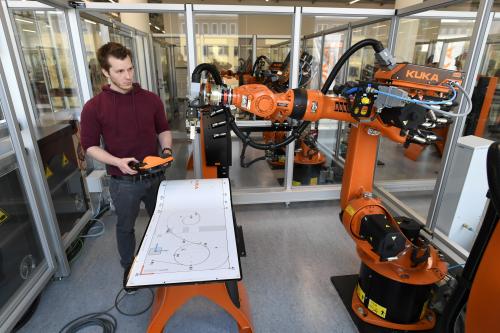This is the final blog in a three-part Future Development series on technological change in Europe, digital technology and productivity gaps, and Greece’s digital future.
After a decade of turmoil, Greece is looking toward a better future—a future of economic recovery, lower unemployment and rising living standards. But 10 years is a long time in the world of technology. Recovery will make life better, but it will not take Greeks back to the pre-crisis world of the mid-2000s. As the Greek economy slid into recession, technological change in the world accelerated noticeably. Greece is returning to a global economy that has been radically transformed.
Before the economic crisis hit Greece, digital transformation and automation was a niche topic outside of a few countries like Japan. The world was in the midst of its last artificial intelligence (AI) winter. Europe was losing jobs to lower-wage economies in Asia, not to machines. Today, things are completely different. Digital technologies are disrupting the prospects for firms, workers, and consumers. Firms in the digital economy—often in the U.S. and China—are racking up record profits way in excess of Europe’s most productive global leaders in manufacturing. Jobs across Europe are increasingly about nonroutine, cognitive, and interpersonal tasks that cannot easily be automated, and machines are gradually taking over manual and routine tasks.
Greece is no different, and its policymakers are contemplating how to take advantage of new opportunities, while managing the disruptive effects. They are dealing with questions that are not easy to answer. Will tech hold Greece back or accelerate its recovery? Does Greece have the wherewithal to thrive in a world of accelerating technological change?
Recent work by the World Bank gives some clues. Countries can thrive with technology if they boost opportunities for people to succeed in the new labor market and for firms to leverage tech for improved productivity. Opportunities for people come mainly through better education: higher enrollments and more graduates with the right skills. Opportunities for firms come through investments in connective infrastructure and broadband access. But firms also have to get aggressive about adopting new technology. For this, they need new managerial competencies and a business environment that encourages investment and innovation. The real question is: Does Greece have what it takes?
Opportunities for people
Greece’s position in education is relatively strong: 44 percent of 30- to 34-year-olds have a higher education degree, compared to the European Union average of 40 percent. Greece also has a tradition of science and technology; it has a relatively high share of STEM graduates, for example. But Greece has not managed to provide enough jobs for them. The result is that Greece has been exporting its talent, especially in tech, instead of allowing it to thrive at home. What’s worse, Greece is struggling to ensure that its future generations of workers have the right foundational skills. More than a third of Greek 15-year-olds failed to achieve basic proficiency in mathematics in the 2015 Program for International Student Assessment (PISA). They are poorly prepared for the new tech-driven labor market and for lifelong learning (Figure 1).
Opportunities for firms
In the business environment, the situation in equally mixed. On the one hand, Greece has managed to engineer a quick catch-up to the EU leaders in broadband access. On the other, few firms are taking advantage of it for e-commerce and other tech-enabled operations. What’s more, Europe’s economies are seeing a widening productivity divide between large and small firms, as larger firms are quicker to adopt new technologies (Figure 2). Greece has an unusually large share of small firms and microenterprises, so it risks falling even farther behind. And much remains to be done in improving the general environment faced by Greek businesses. Greece still lags its OECD peers in the World Bank’s Doing Business assessment, and its labor taxes are among the highest in the OECD.
And yet, while the economic crisis ravaged Greece’s economy and traditional sectors, entrepreneurs in Athens have produced new tech success stories with global reach, such as the mobile platform Upstream, the recruitment software Workable, and the taxi app Beat recently acquired by a Daimler subsidiary and operating in capital cities in Latin America. Moreover, the tech sector’s innovative spirit is beginning to spill over into other sectors such as agriculture, where technology and modern farming practices have jump-started agricultural productivity on some Greek farms. Greece is also not a minor player in cutting-edge digital technology research and development in the EU. Greek enterprises, universities, and research institutions are prominent in Horizon 2020, the big EU program for research and technological development, placing Greece within the top seven countries in Horizon 2020-supported tech research and development in the EU.
What Greece now has to do
Greece can thrive with technology by leveraging its many strengths. This starts with mobilizing its large share of STEM graduates and linking them and their alma maters with the nascent tech sector. Global networks matter more than ever before. While Greece’s long-standing brain drain has worsened during the crisis years, its diaspora offers new opportunities for Greece’s tech sector to connect with entrepreneurs, investors, and scientists around the world.
But even as Greece sets its sights on a digital future, it needs to get its analog fundamentals right. It has to fix its school system to make sure that all students obtain the necessary foundation skills in reading, mathematics, science, and problem-solving. It has to improve the business environment, helping firms raise managerial skills and reducing labor taxes to incentivize firms to create more jobs. And it has to attract foreign direct investment in both manufacturing and services by reducing policy uncertainty.
The Brookings Institution is committed to quality, independence, and impact.
We are supported by a diverse array of funders. In line with our values and policies, each Brookings publication represents the sole views of its author(s).









Commentary
Thriving with technology in Greece
April 25, 2019